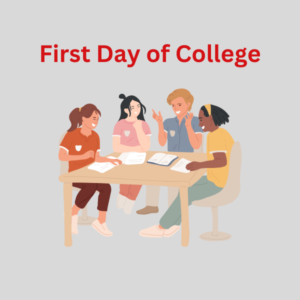Welcome to the first day of college! This is the beginning of a new journey that’s filled with excitement, nervousness, and endless possibilities. Many incoming students find the transition to college life both thrilling and daunting. But don’t worry—whether you’re stepping into your first class or navigating your way around campus, this guide is here to help you make the most of it. College is not just about classes; it’s about discovering who you are, making new friends, and building a foundation for your future.

The First Day of College: What to Expect
The first day of college can be overwhelming. From finding your classrooms to meeting your professors, there’s a lot going on. As you look at your class schedule, you might feel a little nervous. It’s normal to worry about making a good first impression and keeping track of important dates. But with a little preparation, you’ll be able to handle it all with ease.
Getting Started: Arrive Early and Be Prepared
One of the best college tips is to arrive early on your first day. Not only will this give you time to find your classrooms, but it will also allow you to get familiar with the campus layout. If you have a printed or digital map, it can be helpful to avoid feeling lost as you navigate between buildings. Plus, arriving early gives you a chance to grab a good seat and settle in before the class starts.
As you wait for class to begin, take a moment to look over your schedule. Make sure you know where your next class is and jot down any key details you need to remember. When the professor arrives, be ready to introduce yourself and pay close attention as they go over the syllabus. This document is crucial, as it outlines the course requirements, assignments, and other important information.
Making New Friends and Getting to Know Other Students
The first few days are all about first impressions, so don’t be afraid to introduce yourself to the person sitting next to you. Many first-year students are in the same boat—nervous, excited, and eager to make friends. Take the opportunity to chat with your classmates before or after the lecture. Building these connections early on can make your college experience more enjoyable and help you feel more comfortable in your new environment.
Staying Organized and Taking Notes
As classes start, it’s essential to stay organized. Whether you prefer using a notebook or a digital device, taking notes is essential to success in college. Professors often cover a lot of material quickly, so jotting down the main points will help you stay on top of things. Remember to write down any important dates and deadlines for assignments or exams.
Adjusting to the College Lifestyle
The transition from high school to college can be challenging. You might find that you have more freedom and flexibility with your schedule, but this also means you’ll need to manage your time wisely. Make sure to prioritize sleep so you can focus during lectures. Carry a water bottle with you to stay hydrated throughout the day, and don’t forget to eat regularly to keep your energy levels up.
It’s also a good idea to explore the campus. Take some time to locate the library, student center, and other key spots you’ll need throughout the semester. By familiarizing yourself with these areas, you’ll feel more at home and less likely to get lost as you go from one classroom to another.
Frequently Asked Questions (FAQs)
Q: How can I prepare for my first day of college?
A: Arrive early, review your class schedule, and bring necessary supplies like notebooks, pens, and a water bottle. It also helps to know the location of your classes in advance.
Q: How can I make friends on my first day?
A: Be friendly and open! Introduce yourself to classmates and join any activities or orientation events for first-year students. Remember, everyone is looking to make connections.
Q: What should I do if I get lost?
A: Don’t hesitate to ask for directions. College campuses can be large, but seniors and staff are usually happy to help.
Q: How important are first impressions in college?
A: This can set the tone for your college experience. Being punctual, respectful, and attentive can leave a positive impression on both your professors and classmates.
Q: What should I expect from the first class?
A: It’s usually an introduction. Professors will go over the syllabus, explain course expectations, and give you a sense of what to expect for the semester.
